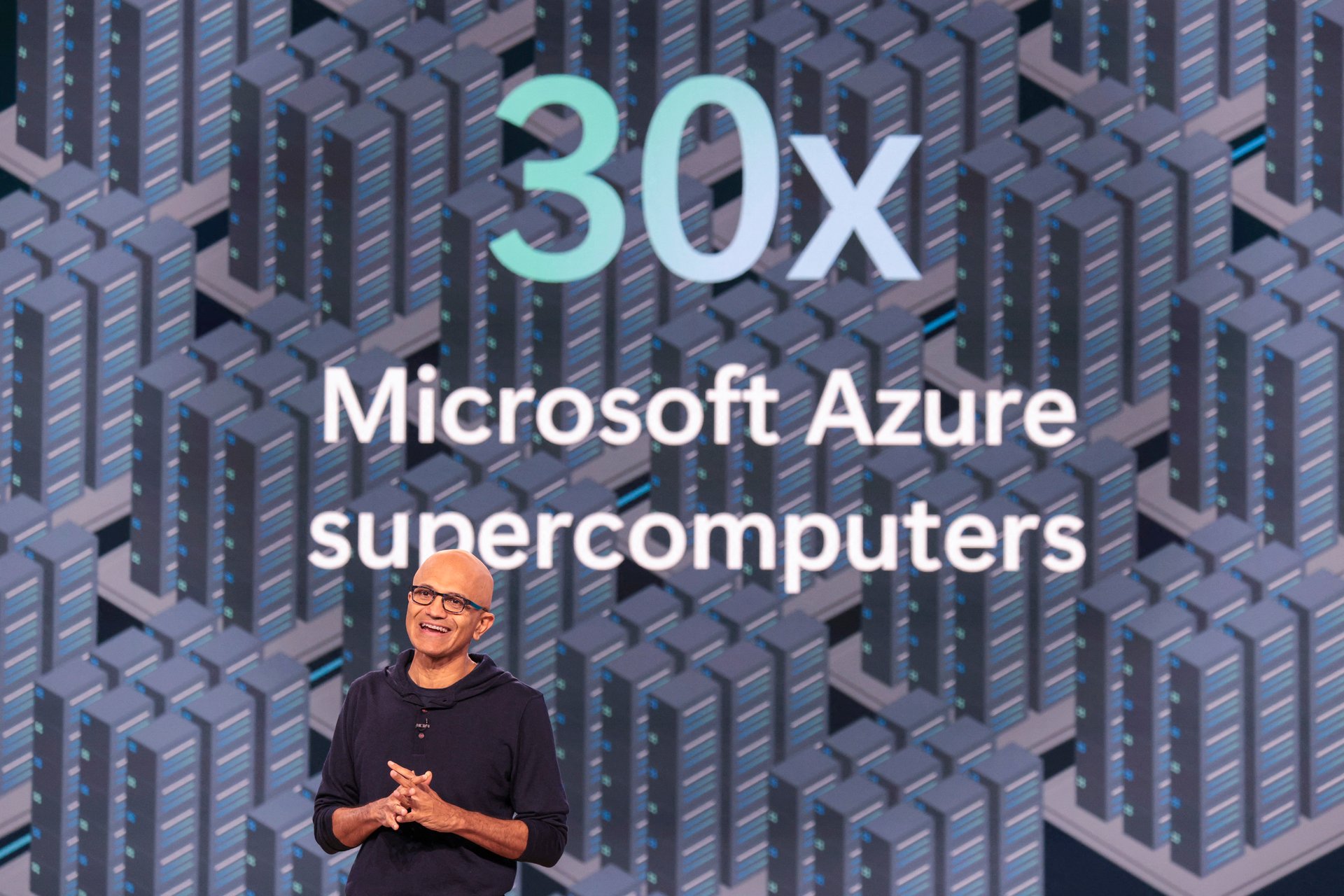Microsoft gets a stock price target raise on accelerating Copilot and Azure revenue
Wedbush predicts that Copilot and Azure will add $25 billion in revenue by fiscal 2026, calling this Microsoft’s “shining moment” in the AI arms race

Jason Redmond/AFP via Getty Images
For Microsoft, the age of AI isn’t coming — it’s already knocking on the data center door, demanding compute, contracts, and cloud-scale monetization. And Wall Street is starting to answer. On Wednesday, Wedbush Securities analysts hiked their price target on Microsoft stock from $515 to $600, citing the dawn of a “massive adoption wave” for the tech giant’s offerings — namely Copilot and Azure — that’s poised to hit in force by fiscal 2026.
Suggested Reading
The AI hype cycle is starting to give way to actual deployment, and Wedbush analysts led by Dan Ives say the reality is finally taking shape on the ground: Customer demand is accelerating, deal conversion is speeding up, and companies across industries are starting to roll out AI use cases at scale.
Related Content
In an analyst note on Wednesday, Ives called this Microsoft’s “shining moment,” saying AI is about to reshape the company’s growth trajectory in a way that Wall Street still doesn’t fully appreciate. Microsoft’s stock is up almost 7% this month — it hit a record high on June 5 as Wall Street continues to price in a future where the company leads the AI pack — and 17% year to date.
Wedbush’s field checks — including conversations with Microsoft partners and customers — suggest that the next three years could bring Copilot and Microsoft’s AI tools to more than 70% of the company’s installed base. That level of penetration would mark a turning point for Microsoft’s enterprise footprint and AI monetization across the board. (Microsoft is one of the 30 companies in Ives’ recently launched ETF that tracks AI stocks.)
Much of that optimism is pinned to Azure, Microsoft’s $80 billion cloud empire, which is increasingly doubling as the company’s AI engine.
Wedbush now estimates that for every $100 a company spends on Azure, it’s spending an additional $50 on AI tools layered into the cloud stack — up from $40. If the trend continues, Ives believes that AI alone could add $25 billion to Microsoft’s top line by fiscal 2026.
He wrote that Microsoft is the “clear front runner on the enterprise hyper scale AI front, despite increasing competition from Amazon/AWS and Google/GCP. The core driver of the impressive Azure value proposition and MSFT next gen enterprise stack is AI....and this dynamic is just starting to take shape in the field in our view.”
This isn’t just a product shift — it’s a strategic realignment. Microsoft is all-in on “agentic AI,” autonomous systems that are capable of multistep planning, memory, and decision-making. Tools such as Copilot Studio and Azure AI Foundry are positioning the company as a developer-first enabler of intelligent agents at scale.
Copilot is playing a central role in Microsoft’s story. Once viewed as a flashy productivity add-on, it’s becoming a central part of the company’s enterprise pitch. Embedded across Office, Azure, and other services, Copilot now spans everything from inbox management to code generation, and early adopters are increasingly becoming evangelists. The pace of deployment, according to Ives, is picking up across industries, with government, finance, and retail among the most aggressive movers.
Much of the enthusiasm stems from what Wedbush called the “true inflection year” of AI growth in 2026, when enterprise budgets shift from experimentation to execution. Chief information officers who spent 2024 and 2025 laying the groundwork for AI integration — through proof-of-concepts and sandboxed tests — are now moving toward broader rollouts.
And that’s changing the financial story for Microsoft. Wedbush estimated that Copilot alone could generate an additional $25 billion in revenue by fiscal 2026.
Behind the scenes, Microsoft is spending heavily to keep up.
Its AI-fueled cloud ambitions come with real costs — namely, a projected $80 billion in capital expenditures for fiscal 2025, as it builds out data centers and infrastructure to meet demand. But to Wedbush, that’s good news. The firm said Microsoft is establishing a “strong competitive cloud edge” advantage over rivals Amazon and “especially” Google, particularly in high-stakes enterprise “bake-offs” where trust, integration, and support matter as much as raw performance — Ives cited Microsoft’s stronger enterprise relationships, faster monetization, and more integrated platform.
Ives said Wall Street still hasn’t quite caught up to the full implications of Microsoft’s AI bet. Despite its trillion-dollar market cap and continued gains in Azure market share, the stock hasn’t fully priced in what Wedbush sees as the next leg of AI-driven growth.
“We believe the stock still has yet to price in what we view as the next wave of cloud and AI growth coming to the Redmond story,” Ives wrote of the Redmond, Washington-based company. “It has become crystal clear to us that the monetization opportunities around deploying AI in the cloud is a transformational opportunity across the industry with Redmond in the drivers seat.”
Microsoft may have started as a productivity company, but it has evolved into a cloud platform, and it now stands as the enterprise AI backbone. For investors, that evolution looks increasingly like a revolution. In other words: The AI boom may just be beginning. And Microsoft, long known for its ability to quietly ride structural tech shifts, is about to get a lot louder — and in the AI era, it’s about to start speaking in billions.
